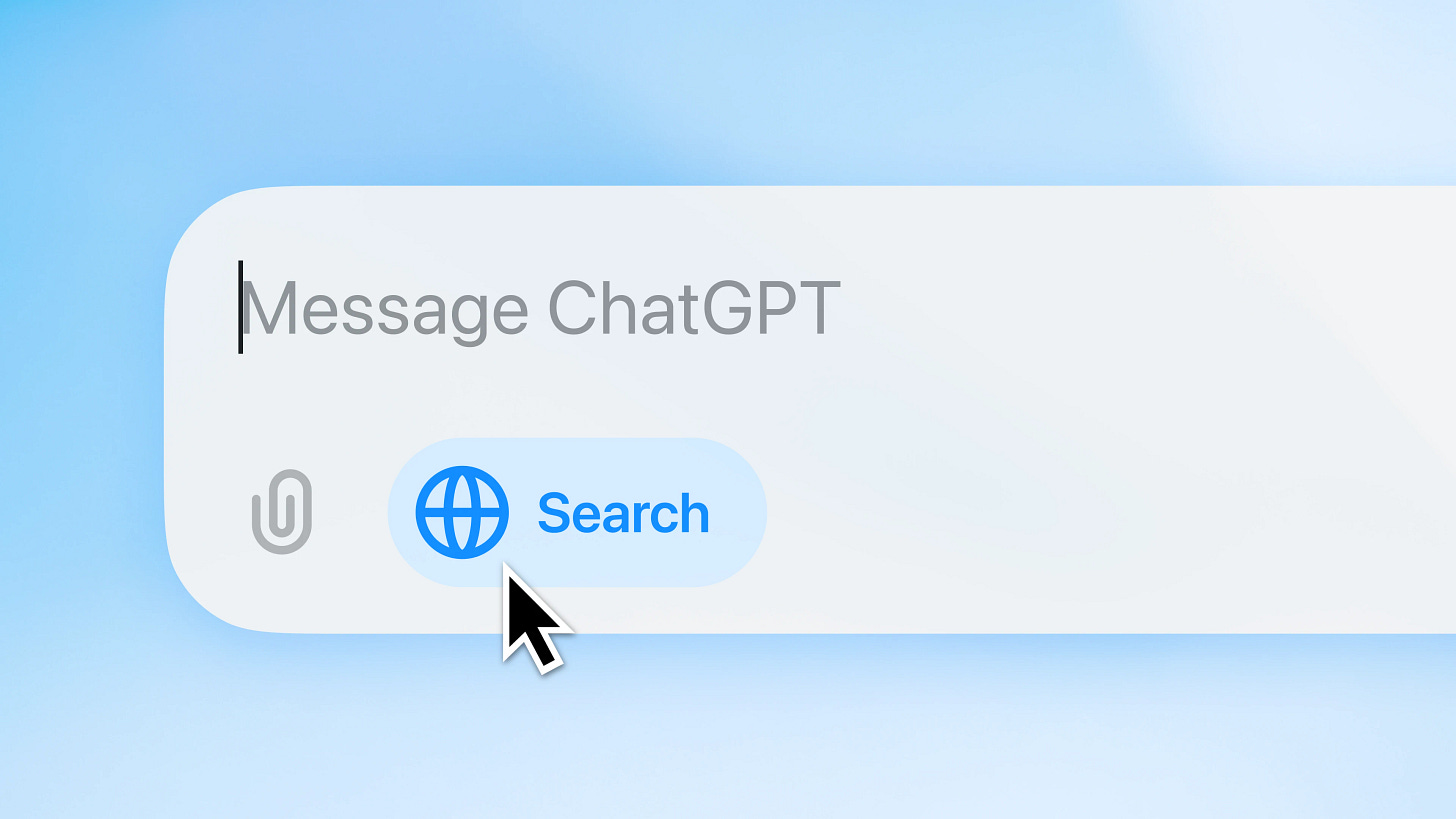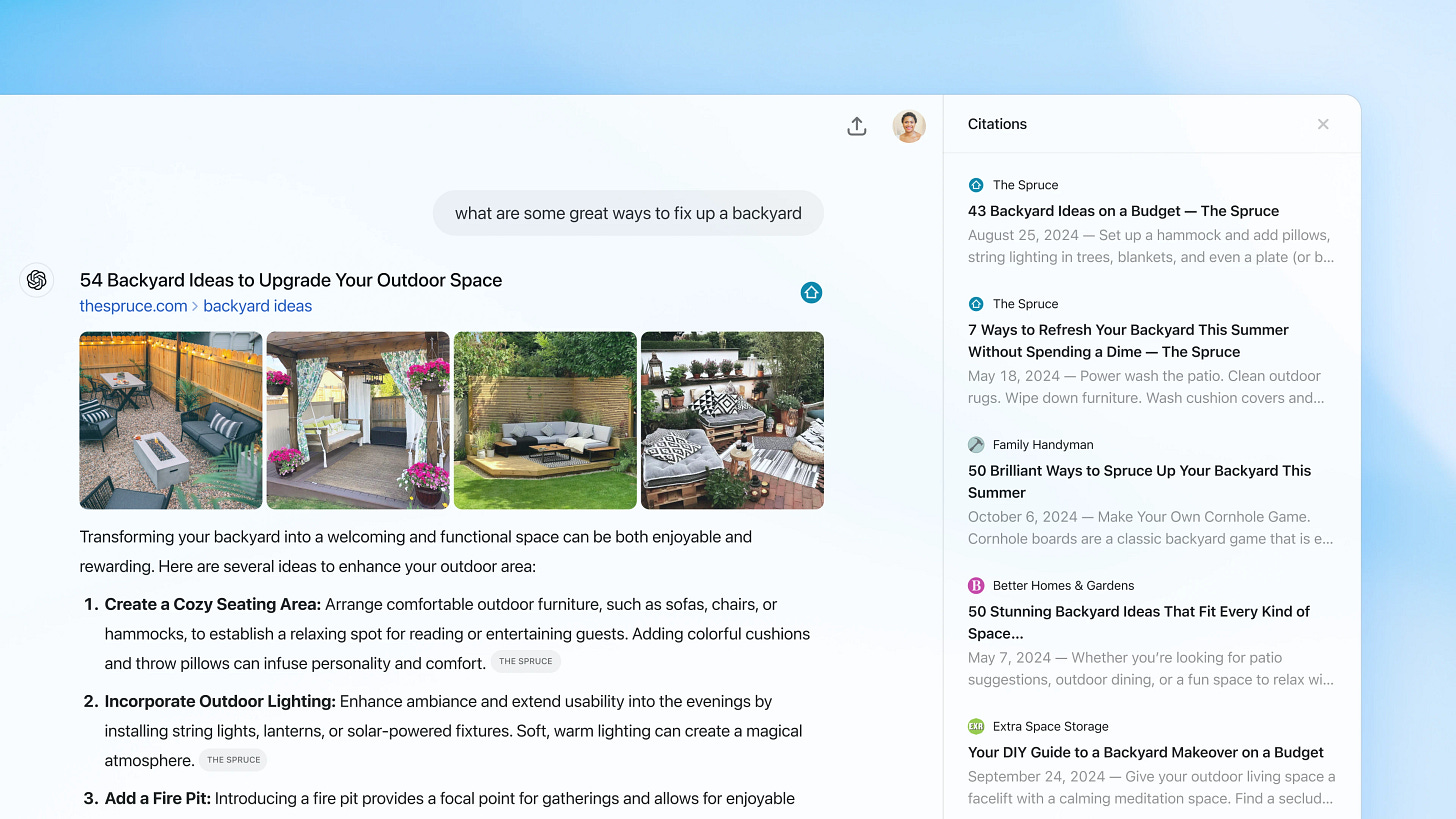Will SearchGPT Replace Google?
OpenAI has recently launched SearchGPT, marking a pivotal moment in the evolution of information discovery.
OpenAI has recently launched SearchGPT, marking a pivotal moment in the evolution of information discovery. The release represents a fundamental shift in how we interact with and consume information online. As we stand at this crossroads of traditional search and AI-powered discovery, the implications for both enterprises and users are profound.
The Search Paradigm Shift
The traditional search paradigm—entering keywords and receiving a list of links—has remained largely unchanged since Google's inception in the late 1990s. While effective, this approach requires users to sift through results, piece together information, and often perform multiple searches to find comprehensive answers. SearchGPT challenges this status quo by introducing a more intuitive, conversational approach to information discovery.
What makes this shift significant isn't just the technology behind it, but how it fundamentally changes the user's relationship with information. Instead of acting as a mere gateway to websites, SearchGPT positions itself as an intelligent intermediary that can understand context, synthesize information, and engage in meaningful dialogue with users. In a few words, it embodies the promise of “semantic search”.
Core Technology and Architecture
At its heart, SearchGPT represents a sophisticated fusion of various AI technologies. Built on a fine-tuned version of GPT-4o, the system leverages novel synthetic data generation techniques to enhance its search capabilities.
This architecture enables:
Dynamic content synthesis from multiple sources
Real-time information processing and integration
Contextual understanding of user queries
Natural language interaction with search results
Deep comprehension of concepts and ideas within search results
The system's ability to maintain context throughout a conversation while pulling in fresh information from the web represents a significant technical achievement. Unlike traditional search engines that treat each query independently, SearchGPT builds on previous interactions to provide more relevant and nuanced responses.
Integration with ChatGPT
OpenAI's decision to integrate SearchGPT directly into the ChatGPT interface is strategic, offering several key advantages:
Seamless transition between conversation and search
Unified user experience across different types of queries
Ability to leverage existing ChatGPT capabilities
Natural extension of familiar interaction patterns
This integration means users can smoothly transition from asking general questions to performing detailed research without switching contexts or platforms. The system automatically determines when to engage its search capabilities based on the nature of the query, creating a more intuitive user experience.
Key Partnerships and Data Sources
Understanding the critical role of reliable information, OpenAI has established partnerships with major news organizations and content providers, including:
Traditional media outlets (Associated Press, Reuters)
Digital publishers (Vox Media, The Atlantic)
International news sources (Le Monde, Axel Springer)
Financial publications (Financial Times)
These partnerships serve multiple purposes:
Ensuring access to high-quality, verified information
Providing proper attribution for content sources
Supporting the sustainability of quality journalism
Enabling real-time access to current events and developments
The integration of trusted source partnerships, combined with OpenAI's broad web search capabilities and commitment to clear attribution, addresses one of the key challenges in AI-powered search: the need for reliable, verifiable information. While partner sources provide authoritative content in areas like news and analysis, SearchGPT can search and synthesize information from across the entire web, including travel sites, retail platforms, and other digital services. By clearly linking to sources and providing context for its responses, SearchGPT maintains transparency while delivering synthesized information.
This foundation sets the stage for a new era in search technology, where the emphasis shifts from finding information to understanding and applying it. As we continue to explore SearchGPT's capabilities, it becomes clear that while this may not be a direct replacement for traditional search engines, it represents a significant evolution in how we interact with information online—whether we're researching complex topics, planning travel, or shopping for products.
Beyond Traditional Search: Where SearchGPT Excels
SearchGPT's strengths become particularly apparent in scenarios where traditional search engines often fall short. Its ability to understand and process complex queries showcases the potential of AI-powered search to transform how we access and analyze information.
Complex Query Handling
While traditional search engines excel at keyword matching, SearchGPT demonstrates remarkable capabilities in handling nuanced, multi-faceted queries:
Natural language processing that understands context and intent
Multi-step problem solving within a single query
Dynamic adjustment of responses based on follow-up questions
Integration of multiple information sources in a coherent narrative
For instance, a user can ask "How has climate change affected agriculture in developing countries, and what solutions are being implemented?" SearchGPT will synthesize information from multiple sources, providing a comprehensive analysis rather than just a list of relevant links.
Research and Analysis Capabilities
In the realm of research and analysis, SearchGPT introduces several innovative features:
Contextual Understanding: Maintains conversation history to build upon previous queries
Deep Dive Analysis: Ability to explore topics from multiple angles
Source Integration: Seamlessly combines information from various authoritative sources
Structured Output: Presents complex information in digestible formats
Content Synthesis and Attribution
Perhaps one of SearchGPT's most significant advances is its approach to content synthesis and attribution:
Clear source linking for all information provided
Integration of multiple perspectives while maintaining coherence
Transparent attribution through inline citations
Ability to generate comprehensive summaries while preserving accuracy
Current Limitations and Challenges
Despite its impressive capabilities, SearchGPT faces several significant challenges that need to be addressed for wider adoption.
Real-time Information Accuracy
The system's ability to handle real-time information presents notable challenges:
Delay in incorporating breaking news and updates
Potential for outdated information in rapidly changing situations
Complexity in verifying real-time data accuracy
Limited integration with live data feeds
Quick Navigational Searches
One area where traditional search engines maintain an advantage is in quick, navigational queries:
Simple queries like "weather today" or "nearest coffee shop" often yield slower or less precise results
Location-based searches can be less accurate
Direct navigation to specific websites can be more cumbersome
Basic fact-checking may require additional steps
"Hallucination" Concerns
The AI model's tendency to occasionally generate plausible but incorrect information remains a significant challenge:
Potential for mixing accurate and inaccurate information
Challenges in distinguishing between verified and inferred information
Need for constant verification against source material
Risk of propagating misinformation despite safeguards
The Google Question: Can SearchGPT Really Compete?
Despite the buzz around SearchGPT's launch, the question of whether it can truly challenge Google's search dominance requires careful analysis. Google processes over 3.5 billion searches daily, with decades of infrastructure development and user trust behind it. The company's search capabilities are deeply embedded in our daily digital lives, from maps to shopping to simple fact-checking.
SearchGPT faces significant hurdles in attempting to dethrone Google. While impressive in handling complex queries and research tasks, it struggles with the bread-and-butter of search: quick, straightforward lookups that make up the majority of daily searches. When users need movie times, store hours, or directions, Google's speed and accuracy remain unmatched.
The search landscape isn't necessarily a winner-take-all scenario. Early usage patterns suggest SearchGPT is creating its own category rather than directly replacing traditional search. While Google excels at rapid information retrieval and local services, SearchGPT shines in areas like research synthesis and complex analysis. This differentiation suggests a future where both platforms serve distinct but complementary roles in the search ecosystem.

User behavior is evolving in response to these new capabilities. Instead of replacing Google outright, SearchGPT is changing how people think about and interact with search technology. Users are beginning to leverage both platforms strategically: Google for immediate, factual queries, and SearchGPT for in-depth research and analysis.
This shift points to a future where the question isn't about replacing Google, but rather about expanding the definition of search itself. SearchGPT represents the emergence of a new category of AI-powered information tools that complement, rather than replace, traditional search engines. The real innovation may lie not in competition, but in how these technologies combine to create richer, more diverse ways of accessing and understanding information.
The Future of SEO in an AI Search World
The rise of SearchGPT also signals a fundamental shift in search engine optimization (SEO) strategies. Traditional SEO practices built around keyword optimization and backlink strategies will need to evolve as AI-powered search becomes more prevalent. While technical SEO elements won't disappear entirely, success will increasingly depend on creating comprehensive, authoritative content that demonstrates genuine expertise rather than surface-level articles optimized for specific keywords.
Content creators and content-heavy companies will need to focus less on keyword density and more on contextual relevance and semantic relationships. SearchGPT's natural language processing capabilities mean that content written naturally for human understanding will likely perform better than content artificially structured for search algorithms. This shift is already evident in how SearchGPT evaluates and synthesizes information from its partner news organizations and authoritative sources.
The emphasis on E-E-A-T principles (Experience, Expertise, Authoritativeness, and Trustworthiness) will become even more crucial in this new landscape. Organizations will need to establish clear authorship, provide comprehensive source attribution, and maintain consistently accurate information to build authentic authority in their specific subject areas. Success metrics will likely evolve beyond traditional ranking positions to include factors like content authority scores, comprehensive topic coverage, and the frequency of AI-powered systems citing your content as a primary source.
The Bottom Line
As we assess SearchGPT's impact on the search ecosystem, it's clear that we're witnessing not a replacement of existing search technology, but rather an expansion of what search can be. The future of search appears to be moving toward a more diverse landscape where different tools serve different purposes in our quest for information.
Traditional search engines like Google will likely maintain their dominance in quick, factual queries and local search, while AI-powered platforms like SearchGPT will excel in areas requiring deeper analysis and synthesis. This specialization suggests a future where users become increasingly sophisticated in choosing the right tool for their specific information needs.
Future advances will likely bring rapid evolution in several key areas:
Integration of real-time capabilities to address current limitations in handling breaking news and updates
Enhanced accuracy in quick navigational searches to better compete with traditional search engines
More sophisticated handling of multimedia content, including images, videos, and interactive elements
Improved mechanisms for verifying information accuracy and reducing AI hallucinations
Most importantly, we should expect to see continued innovation in how these technologies complement each other. Rather than asking whether SearchGPT will replace Google, the more relevant question becomes how these technologies will evolve together to create more powerful and accessible ways of discovering and understanding information.
The true value of SearchGPT may not lie in its potential to disrupt existing search paradigms, but in its ability to expand our conception of what search can be and to provide more powerful user experiences. As we move forward, the success of search technologies will increasingly be measured not by market share alone, but by their ability to adapt to and enhance the way humans naturally seek and process information.
Keep a lookout for the next edition of AI Uncovered!
Follow on Twitter, LinkedIn, and Instagram for more AI-related content.





